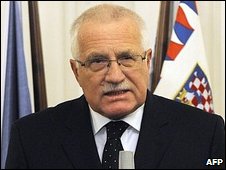
Vaclav Klaus had vehemently opposed the Lisbon Treaty
|
The president of the Czech Republic, Vaclav Klaus, has signed the EU's Lisbon Treaty, the final step in the charter's ratification. The treaty was drawn up to streamline decision-making in the EU, and is a watered-down version of a draft EU constitution rejected four years ago. Among its measures, it creates a European Council president and alters the way member states vote. The treaty could now come into force as early as December. The Lisbon Treaty's supporters say it will allow the EU to operate more efficiently and give it greater influence in world affairs. Critics say it will cede too many national powers to Brussels.
 |
LISBON TREATY
Creates new post of EU president (President of European Council)
New post of high representative for foreign affairs
More decisions by majority vote rather than unanimity
Only Irish Republic held referendum on it - twice ('Yes' vote second time)
Took a decade of negotiations
Was intended to take effect in January 2009
|
Speaking in Washington ahead of an EU-US summit, European Commission President Jose Manuel Barroso welcomed the removal of the "last hurdle" to the treaty's passage. "I think that the transformational potential that is there, the new external profile for the European Union, will be felt immediately," he said. In the UK, William Hague, the shadow foreign secretary for the opposition Conservatives, said it would no longer be possible to hold a referendum on the treaty if his party won a general election next year. The party had previously argued that the treaty should be put to a popular vote. Court 'bias' British Prime Minister Gordon Brown welcomed the ratification, and said it marked the end of years of debate. "Today is a day when Europe looks forward," he said.
 |
ANALYSIS
Oana Lungescu, BBC European affairs correspondent
Diplomats say the treaty, meant to give the EU a stronger voice in the world, is likely to come into force on 1 December.
It will create a European diplomatic service and two powerful new jobs - EU leaders are expected to choose a permanent president of the EU Council and a foreign policy chief within days. After intense speculation about former UK Prime Minister Tony Blair, the front-runner to become the first EU Council president is the low-key Belgian Prime Minister Herman Van Rompuy, with British Foreign Secretary David Miliband tipped as favourite for the second top job. |
The Czech Republic was the last of the EU's 27 member states to ratify the treaty. Mr Klaus signed it shortly after the Czech constitutional court rejected a complaint against it, ruling that it was in line with the Czech constitution. Announcing in Prague that he had signed the treaty, the Czech leader accused the court of bias and said the Czech Republic would "cease to be a sovereign state". The Eurosceptic Mr Klaus had recently said he would no longer attempt to block the treaty, after receiving the promise of an opt-out from the EU's Charter of Fundamental Rights. Mr Klaus said the opt-out was needed to avoid property claims from ethnic Germans expelled from Czechoslovakia after World War II. The Lisbon Treaty replaced an earlier draft constitution that was rejected in referendums in France and the Netherlands in 2005.
The treaty was initially rejected in a referendum in Ireland, before being endorsed in a second Irish referendum last month. It would create two major new posts: a new European Council president who would serve a term of two-and-a-half years, and a new foreign policy chief whose role would combine those of the existing foreign affairs representative and external affairs commissioner. In addition, the treaty will alter voting procedures, with national vetoes to become the exception rather than the rule in most policy areas. For the first time, it will also offer a way out to any member states that decide to leave the EU.
|

~RS~q~RS~~RS~z~RS~17~RS~)





Bookmark with:
What are these?